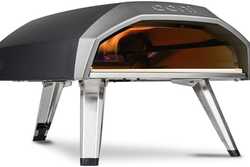- Cutting width: 21 inches
- Power source: Gas
- Weight: 79 pounds
- Cutting options: Bag, mulch, rear-discharge
- Adjustable cutting height: Seven positions; 1 to 4 inches
- Price on publish: $549
The Best Lawn Mowers For Maintaining Your Outdoor Oasis
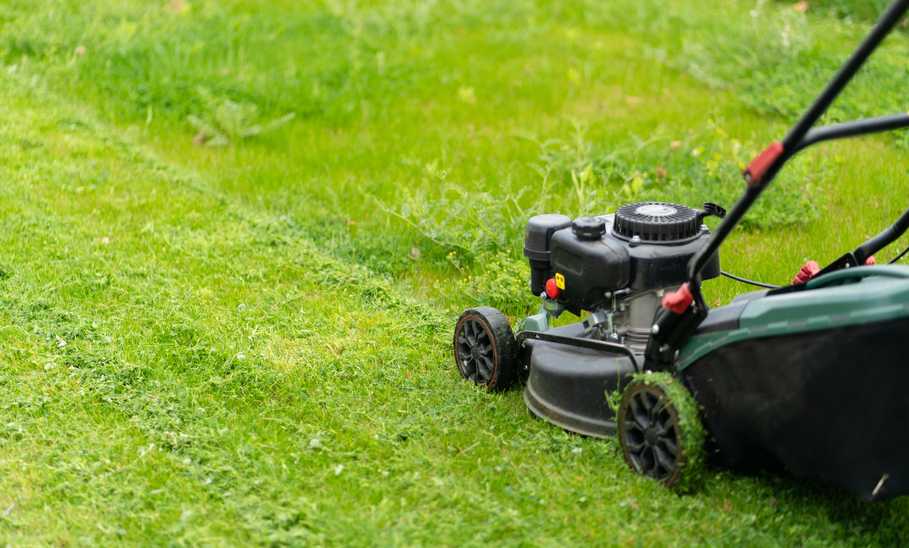
Our evaluations and opinions are not influenced by our advertising relationships, but we may earn a commission from our partners’ links. This content is created by TIME Stamped, under TIME’s direction and produced in accordance with TIME’s editorial guidelines and overseen by TIME’s editorial staff. Learn more about it.
As Kody J. Ketterling, lawn, garden, and landscaping expert and owner of K-IT Products says, “People buy a mower to keep their grass cut or manicured so they don’t have to pay someone else to do it and so they can do it the way they like it.” My father was a big believer in that last one. He went one step further, though, and taught me and my brothers the intricacies of mowing the yard how he liked it. We grew up with a basic, Allis-Chalmers gas-powered riding mower, a couple gas-powered push mowers that were always a pain to pull start, and an old fashioned reel mower.
Maintaining your yard gives you a desirable and pleasant setting for your outdoor furniture, grills, porch or tree swings and hammocks, and helps you cultivate an outdoor oasis for you and your loved ones to enjoy and relax in (once the mowing is done, of course). Keeping the grass mowed also reduces the chance of it contracting diseases as well as cutting down on bug infestations (mosquitos love tall grass that remains damp near the soil).
Owning your own mower—or mowers—gives you freedom to mow when you want, says Ketterling, “and allows you to mow in the direction and heights that you desire.” These may seem like trivial details to some, but for many, (like my dad), they are quite important. To help in this important decision, I’ve put together a list of the best lawn mowers on the market.
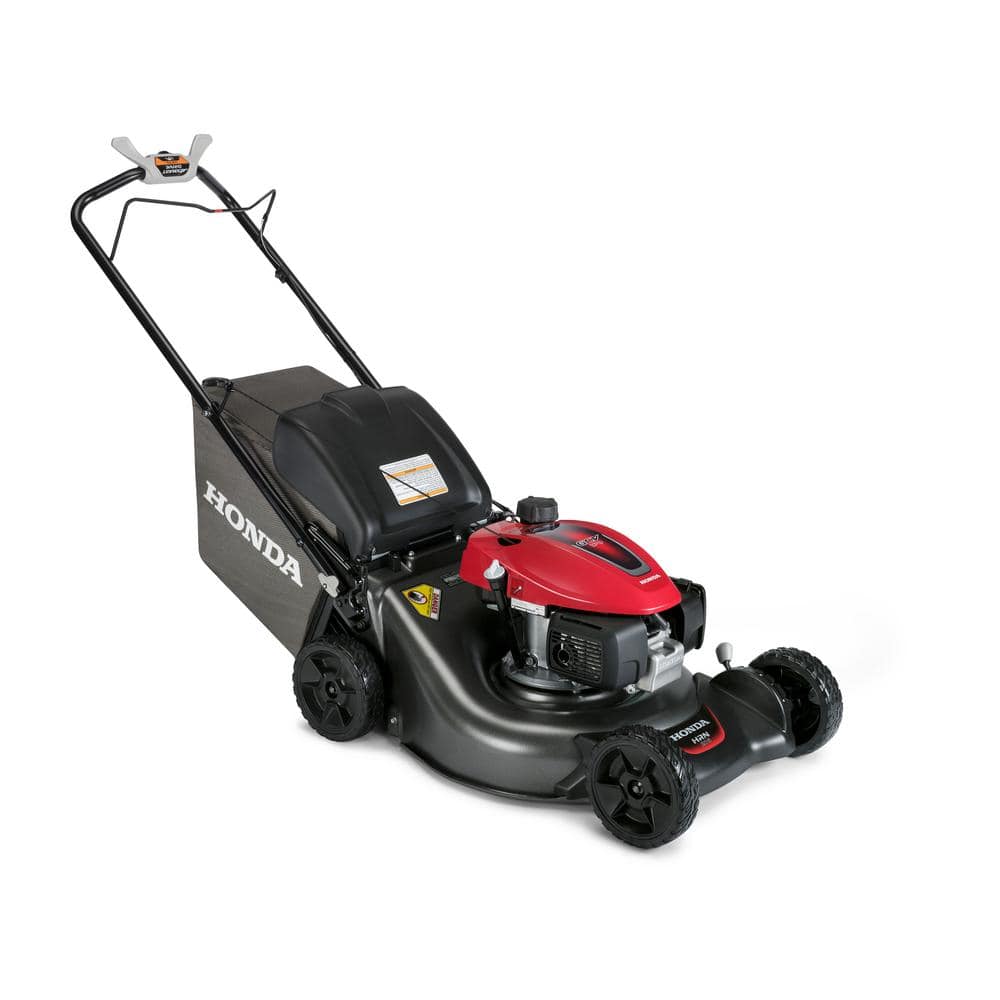
This 3-in-1 variable speed mower from Honda allows you to match the speed with your stride for comfort and the auto-choke features means it starts reliably with one pull. The 3-in-1 system adjusts with a slide of a lever for mulching, cutting, or rear discharge and the twin blade system provides an even cut with small clippings when bagging or mulching (one blade lifts the grass while the other mulches). The self-propel feature works by pressing the lever on the handle — useful for larger yards or for people who may become fatigued pushing this relatively heavy mower about.
For most people with medium to small yards, this mower offers the best in reliability, power, and ease of use.
Reliable, mid-range, gas powered mower from Honda with auto choke and mulching, bagging, and rear discharge capabilities.
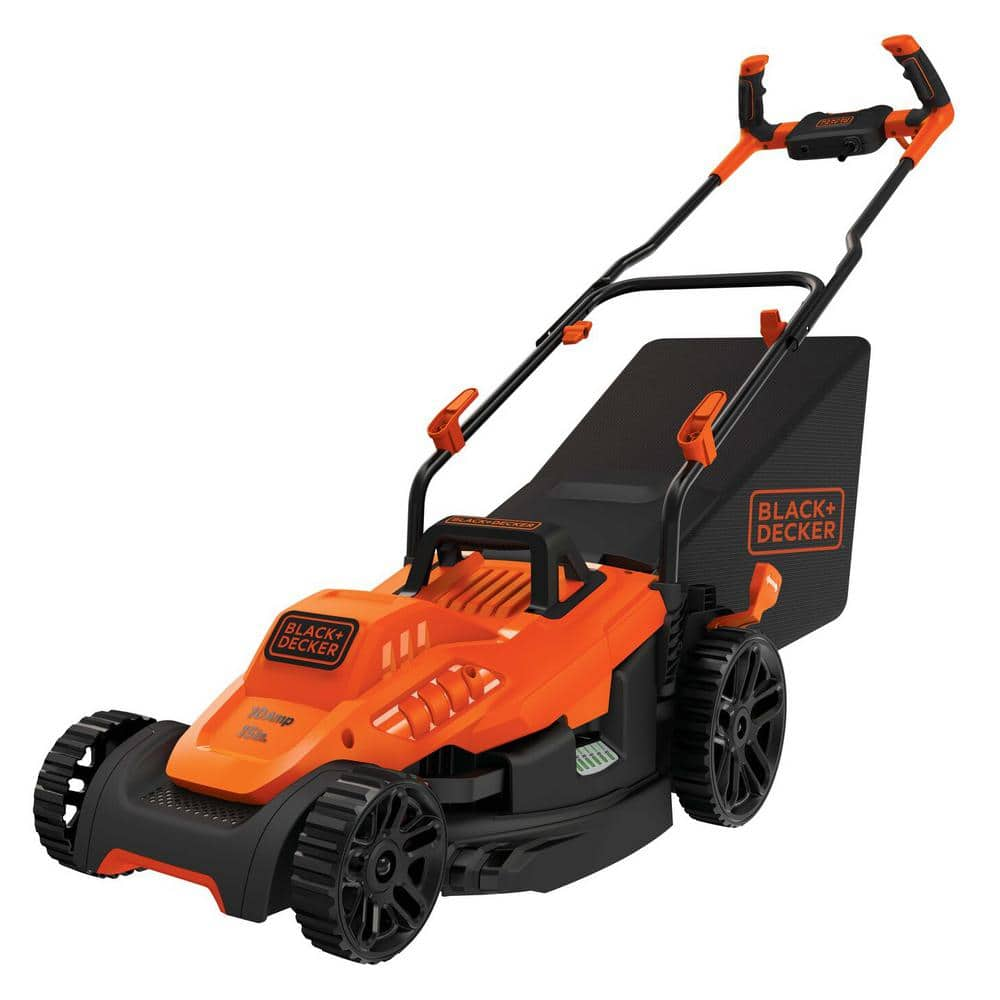
With a push-button start and light overall weight, this 10 AMP, budget-friendly lawn mower from Black+Decker is easy to use and provides a clean, reliable cut. The fact that it doesn’t run on gasoline means it’s eco-friendly and quiet. You will need to purchase an extension cord so you can reach your entire yard, but as someone who owned one of these when they first came out in the early 2000s, the absence of a pull cord to start it and the price make up for any cord wrangling you’ll need to perform.
Budget-friendly, eco-conscious, corded lawn mower from Black+Decker with an included detachable collection bag.

Ionel Giuran, lawn care expert at Fantastic Gardeners recommends this mower for gardens and lawns of small to medium size.
“In addition to cutting the grass neatly and evenly, the mower is also capable of going over bumps with ease,” he says. This is due to the wide 10-inch rear wheels and 7-inch front wheels. The 3-in-1 design allows for multiple options when it comes to grass clippings including rear bagging, side discharge, and mulching.
Keep in mind, though, that you’ll likely have to hold the cord with one hand to keep it out of the way while mowing, which is the one significant drawback for these kinds of mowers.
Corded electric mower with mulching and bagging capabilities that cuts grass neatly and evenly.

Gas-powered lawn mowers produce a great deal of noise; in fact, many communities prohibit their use during certain hours. They also emit potentially dangerous gas fumes which aren’t all that healthy for the environment. While electric push mowers have been around for a while, people with larger yards requiring a riding mower didn’t have any alternatives to gas. Until now.
This electric riding mower from Greenworks features a 24-horsepower gas equivalent via the four brushless motors run by six 80 Volt batteries with a coverage area of up to two acres on a single charge, high intensity LED headlights, rear cargo storage capable of hauling 200 pounds (great for soil, fertilizer, and seeds), app connectivity with anti-theft device, and a cutting speed up to 6 mph. And according to the company, it's four times quieter than gas, which means you can mow your grass in the wee hours of the morning without fear of disturbing your neighbors (or your slumbering family).
Environmentally friendly, quiet, electric riding mower from Greenworks with 24 horsepower gas equivalent, rear storage holding up to 200 pounds, and four-year warranty — an excellent alternative to a gas mower.
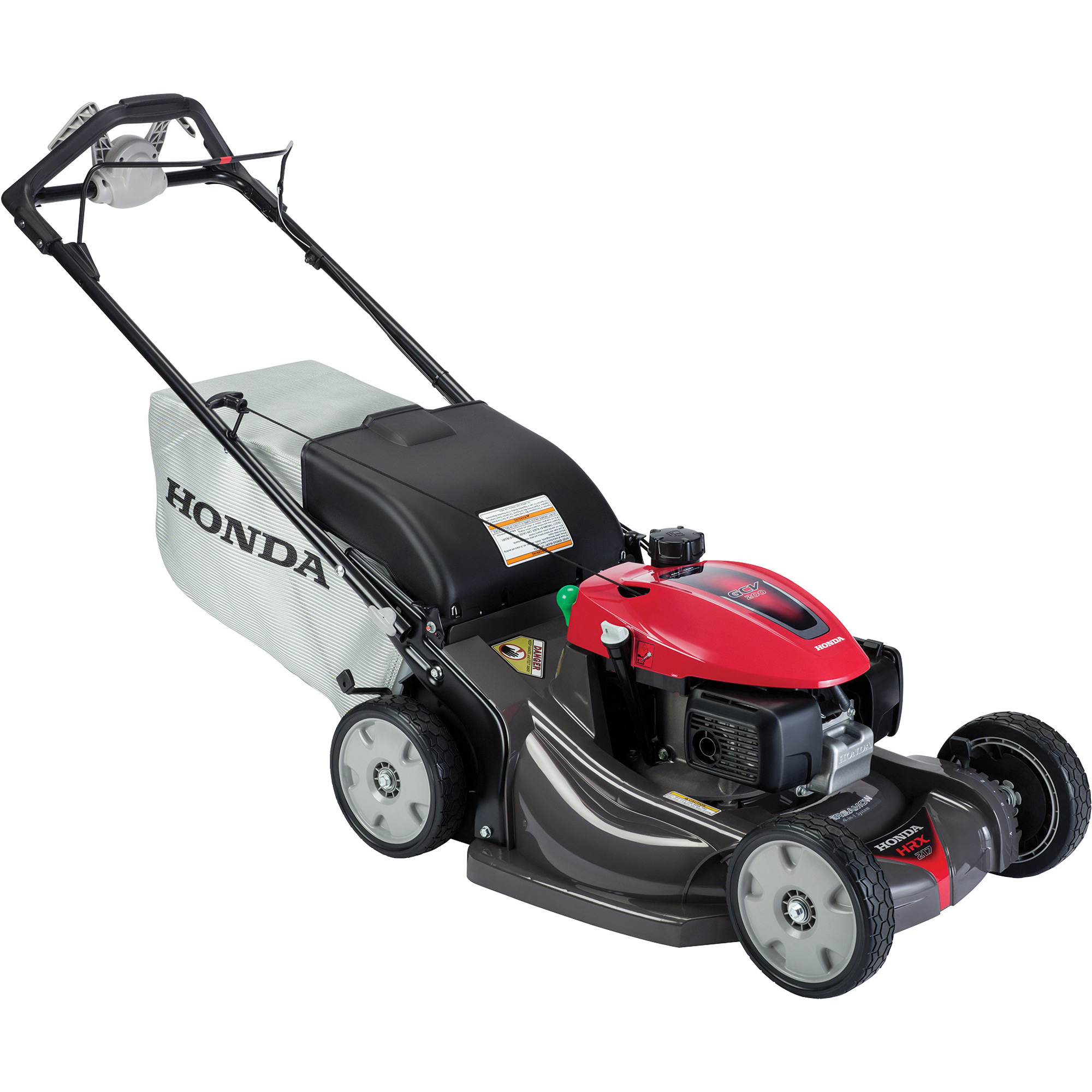
Full of features such as an auto choke and a variable select drive which allows you to set a speed that matches your pace, this Honda is one of the best gas-powered options available. Cutting options include leaf shredding, rear bagging, and bagless discharge. The twin blade system, equipped with four cutting surfaces, produces some of the most ultra-fine clippings I’ve seen.
Caballero says, “A gas-powered push mower offers reliability and superior mulching capabilities.” I am always a fan of mulching rather than raking or disposing of grass clippings and, as my dad (who was a farmer and horticulture teacher) taught me, mulching covers your grass like a blanket, shading the soil from intense rays of sun and keeping the moisture in. Which, ultimately means less watering.
Gas powered, reliable Honda self-propelled lawn mower with mulching, bagging, shredding, and side discharge cutting options.
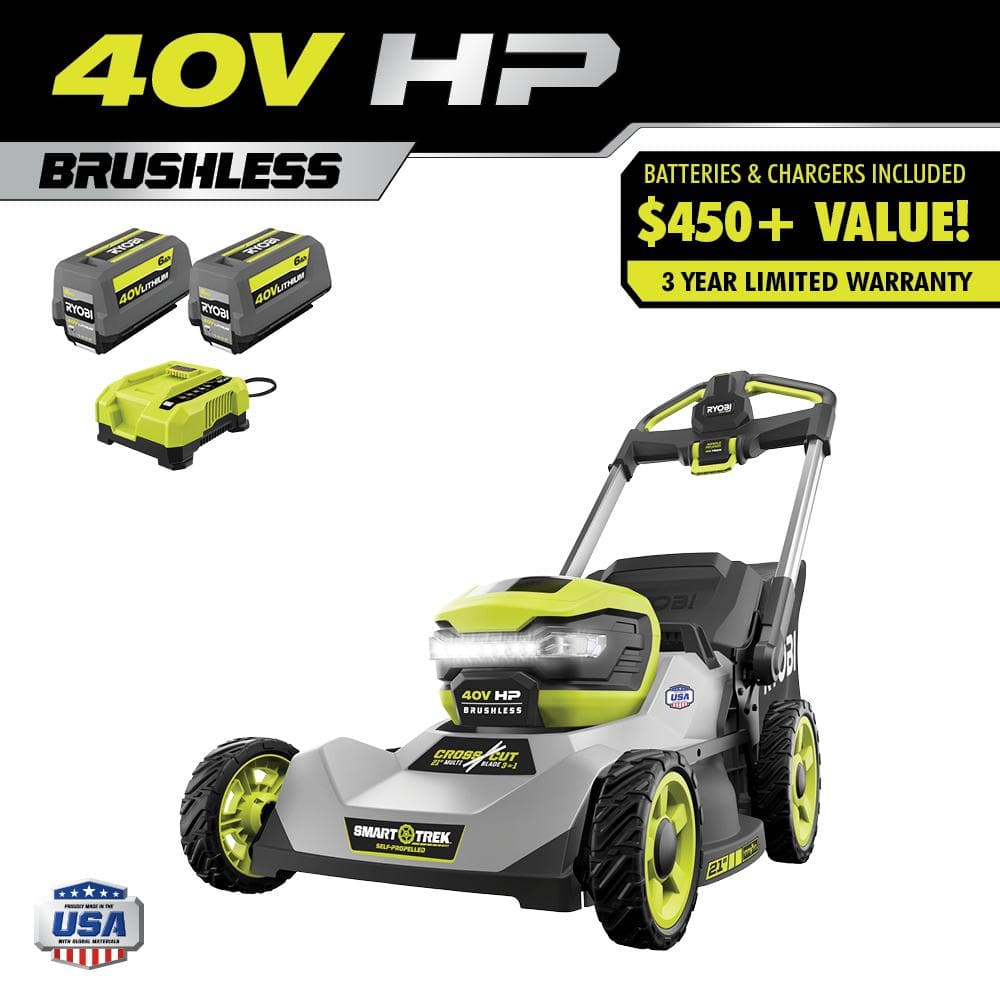
Ketterling recommends Ryobi mowers because they cut well and evenly and are easy to use. “Just make sure that you have an extra battery in case you need it,” he says. (Ryobi’s batteries are compatible with their whole line of 40V equipment so you can use them with more than just the mower.) The brushless motor provides exceptional power and runtime (up to 70 minutes) while the Smart Trek technology allows you to match the self-propelling speed to your gait.
It comes with a 40-Volt rapid charger, a five-year warranty, and bright LED headlights.
Self-propelled, battery lawn mower from Ryobi that offers an impressive 70 minutes of runtime.
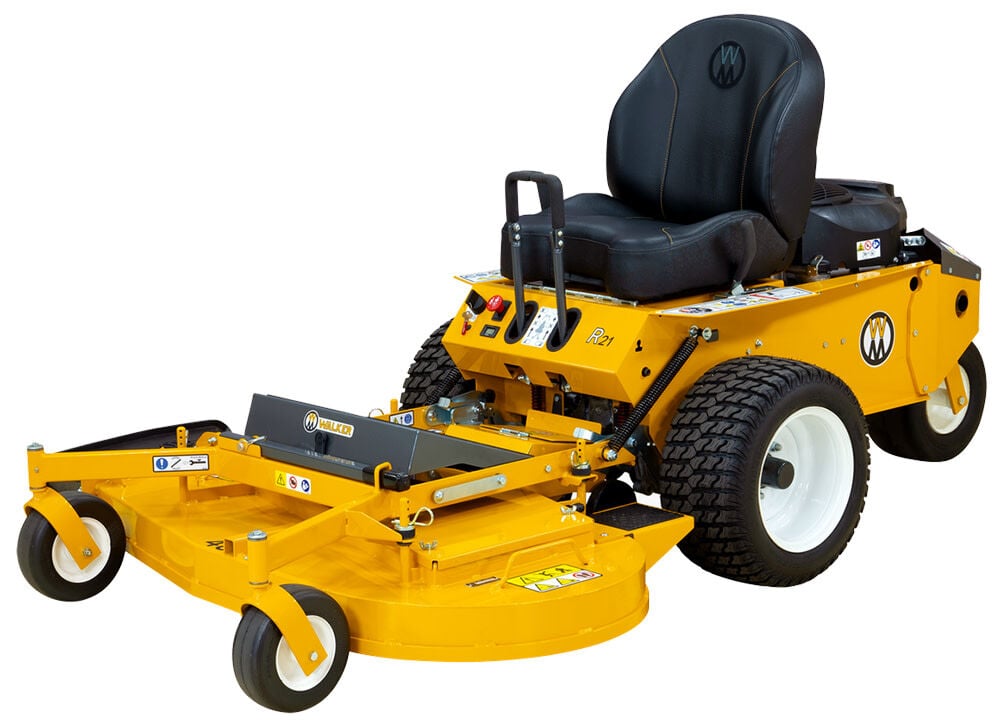
For a riding mower, Ketterling recommends the Walker. “They are built tough and to last. They’re easy to maneuver and they’ll even stripe the lawn giving you some design when you mow,” he says.
They require little maintenance making them easy to care for. The commercial version of the Walker (which Ketterling uses in his business) will set you back about $20,000 but the residential model costs significantly less at around $6,000. Plus, they also function as a mulcher so you don’t have to collect the grass.
Tough, reliable, easy-to-use riding mower for residential use from well-known commercial grade mower manufacturer, Walker.
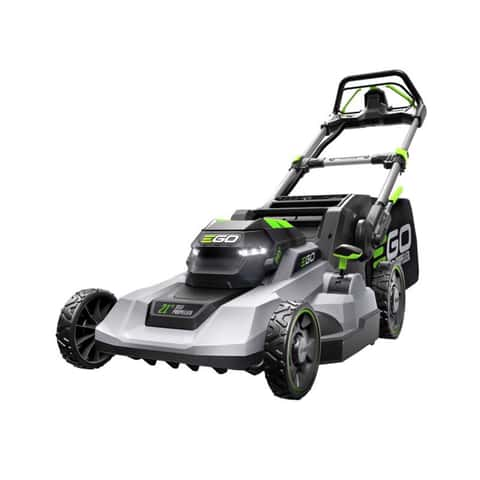
Along with EXMark self-propelled mowers, Ketterling’s company uses these Ego Power+ mowers.
“We use both of these because of the ease of self-propulsion and the durability of them,” he says. The self-propel system operates via two levers, and a speed dial allows you to adjust with an easy twist. All while delivering 6 foot-pounds of torque — more than many gas-powered mowers — which is what makes it so easy to maneuver around obstacles.
“Because of its powerful self-propelling technology, it moves along the grass almost without any effort on your part,” says Giuran (who also recommends this mower). Be aware, though, that it may take some time to get used to this feature.
Self-propelled, battery-operated walk behind mower that works well for smaller yards.

If my family had a riding mower like this when I was a kid in the 1970s and 80s, my brothers and I wouldn’t have tried so hard to get out of mowing the couple of acres my parents owned. With comfort features like an under-seat cubby, padded seat, front step-through, and cup holders (!) I would have been happy to take on the responsibility.
“Zero-turn mowers like the Toro TimeCutter are ideal for their speed and maneuverability,” says Caballero, “making them perfect for mowing around obstacles quickly and efficiently.”
Equipped with Smart Speed technology, this one provides optimum control with a range of speeds up to 7 mph while the zero-turn technology means the actual mowing will take less time, leaving room for all the other chores your offspring attempt to avoid.
Zero-turn riding lawn mower with comfort features that will make you (and your kids) look forward to mowing the grass.

For small yards under half an acre, Caballero says electric mowers like the EGO Power+ series are excellent choices for their quiet operation and eco-friendliness.
This variable speed, self-propelled lawn mower runs on a 56V, 4.0Ah ARC lithium battery which provides up to 33 minutes of power on a single charge. It comes with two batteries for continuous operation on bigger yards. Other features include LED headlights, one-handed height adjustment, push-button start, and folding for compact storage.
“It produces no fumes,” says Giuran, “and requires a minimum amount of maintenance while providing the same power as a gas mower.”
However, he cautions, considering that it is a battery-powered device, you could find yourself out of fuel in the middle of mowing if you forget to charge it fully and don’t have a spare battery on hand. Hot tip: purchase an extra battery or two.
Battery-powered, self-propelled mower with variable speeds, a powerful motor, and mulching and bagging capabilities without the gasoline fumes.

Riding mowers like those made by John Deere provide comfort, efficiency, and power, according to Caballero. This makes a great option for large yards, like the one at my parents’ house that my brothers and I mowed when we were kids. Growing up in the Midwest with grandparents who owned a working farm, green John Deere tractors were a well-known product from a respected brand. The company still builds their machinery in Greenville, Tennessee and they still offer excellent reliability to handle tough chores.
This version features the John Deere Easy Change Oil System which allows anyone to complete the task in 30 seconds, a 22 horsepower V-Twin engine, hydrostatic transmission, side-by-side foot pedals, and cruise control (among others). Available attachments include a front snow blade, snow blower, tow behind cart, lawn sweeper, canopy, and lawn aerator.
Reliable, efficient, and powerful riding lawn mower from John Deere with a suite of convenient features like the 30-second oil change system.

With 3-D vision, 180 minutes of mowing time per charge, multi-zone management, and programmable mowing schedules (they mow even when you’re out of town), Alexa and Google home connectivity, and all-wheel drive that can climb up to a 30-degree slope, the MamMotion LUBA 2 offers the latest technology in lawn maintenance.
Ketterling recommends the MamMotion because instead of wires like some other robotic mowers, they use GPS.
“They’re easy to set up,” he says, “with all kinds of options like height, direction, designs (you can mow messages and symbols into your lawn if the mood strikes you), how they climb, and what they can do.”
You can charge them via an electrical plug or set them up to use a solar panel. And, Ketterling adds, they mow exact and very straight lines — being the robots that they are.
This mower offers the latest in robotic lawn mower technology with wire-free operation, app connectivity, solar charging, and lawn printing (a feature you never knew you needed).

If you want an alternative to heavy gas-powered motors and don’t want to worry about a cord or charging a battery, this vintage-inspired manual lawn mower offers a reliable, lightweight, low-maintenance alternative to cut your grass. Plus, you get a workout in at the same time.
It’s equipped with five cutting blades, a wooden handle, and 10-inch polymer wheels for mobility and maneuverability.
Manual, lightweight, vintage-inspired, reel, push lawn mower with five blades for pollution free grass cutting.
For big yards of ¾ of an acre or more, Ketterling recommends a zero-turn mower as they are easy to ride, capable of getting into and out of small corners, and capable of covering big areas. Gene Caballero, co-founder at GreenPal and a 25-year veteran in the landscaping industry, also suggests a zero-turn mower for large properties as they provide enhanced efficiency with their agility and speed.
“The bigger the area the bigger the mower,” Ketterling says.
Beyond just the overall size of your yard, consider your terrain. That includes hills, valleys, and obstacles such as flower and garden beds, and trees. For small, flat yards, a manual reel or electric mower will likely suffice, says Caballero, “while for larger or hilly terrains, you may want to consider a gas-powered or self-propelled mower.”
Consider features like mulching capabilities, adjustable handle height, and mowing (cutting) options. For example, mulching leaves the grass on the ground, but cuts it up really fine, while bagging deposits the cut grass into a connected bag that you then dispose of.
“Keep in mind that the more bells and whistles that you get, the more things there are that can go wrong that you’ll need to maintain,” says Ketterling.
“We always recommend a self-propelled mower that will drive itself with you guiding it,” says Ketterling. These are different from push mowers that move forward and backward by your strength alone. Think of a self-propelled mower like an electric assist bicycle — it provides pedal assist but still needs a human to guide and steer it.
“A self-propelled mower will drive itself, dragging you around the yard if you want,” explains Ketterling. Or, you can slow them down so you’re simply walking behind them.
“They are easy to move and work with and can make mowing better,” he says. If only there had been self-propelled mowers when I was kid. I may have spent less time and energy trying to avoid the hated chore, and less of my allowance bribing my big brother to take my turn.
Many push mowers fold down so that they take up less space when not in use. If you’re planning on purchasing a riding mower, make sure you have room in your garage to keep it. Though my parents now have a three car garage, when we were growing up, it was a single car garage, and there was a lot of jockeying and moving of equipment (and my dad’s corvette) every time we mowed the grass.
“Evaluate whether you prefer a manual, electric, or gas-powered model based on your comfort with maintenance and environmental concerns,” says Caballero.
Electric mowers are “greener” and more environmentally friendly than gas-powered mowers. They do not emit dangerous fumes, are generally easier to start (by the push of a button) and maintain, and are also lighter weight than a gas equivalent, making them easier to maneuver.
Many, though, are not as powerful as gas powered options (though that is changing).
“Some gas mowers are stronger and more powerful and can handle different types of grass and terrain,” explains Ketterling. “Electric mowers are getting to that point and they can handle most of these environments but that means their overall battery life between charges becomes shorter.”
Electric mowers come in corded and battery versions. Corded means you’re more limited to the amount of area you can cover — and you need to be mindful of wrangling the cord and any extension cords as you work. Battery powered mowers limit the amount of continuous run time you have available. Most offer one to two hours of mowing before needing to be recharged.
There are also reel motors that run by human power alone. While a powered mower uses the engine to move the blades and get around, a reel mower will only turn and cut if you push it. A reel mower requires sharpening often, says Ketterling, in order to keep it working well.
Seated mowers, especially zero-turn versions, do not put stress on the body and “they can get into the tight corners easily,” according to Ketterling. They’re also more time efficient for larger lawns than push mowers.
For any mower, Ketterling recommends enough power to cut through grass 4-inches high.
“The [horse]power of the engine is what will create the ability to suck the grass and put it in the bag,” he explains. Also consider the size of the deck that houses the blade. He recommends no smaller than a 22-inch blade. Some mowers come with two blades which provide better cutting power. One blade cuts while the other pushes the grass to the back of the mower.
“Look for a mower with a blade you can take off easily and sharpen,” says Ketterling. If you don’t keep your blades sufficiently sharp, this can cause bearings to seize up.
Also, look for one that allows the blades to be engaged and disengaged at any time for safety.
Proper maintenance of your lawn mower, including sharpening the blades and cleaning the carburetor, is essential for efficient performance, says Caballero. It's also crucial to change the oil annually, replace or clean air filters to ensure efficient operation, and check the spark plugs, which may need replacement to ensure easy starting.
To help maintain an even cutting performance, you should regularly inspect the fuel system for leaks and ensure the tires are properly inflated. You should also regularly clean the undercarriage to remove grass clippings and debris to prevent clogging and rusting.
According to Ketterling, proper maintenance also includes storing the mower in a place where it won’t get weathered and battered from the elements, and using the type of fuel recommended by the manufacturer. You should also avoid leaving gas in the mower for extended periods of time as it can cause the engine to malfunction.
In order to make my recommendations, I talked to landscaping and gardening professionals about what to look for in a mower and the best options for various scenarios.
I read online reviews for every mower included here (as well as countless others) to compile the best options for specific yard sizes and power preferences.
I also took into consideration my own personal experiences with various types of mowers and brands, weighing those carefully against the data from my experts and the plethora of online reviews and recommendations available.
I considered price, power source, ease of use, versatility, and features to determine the best possible mowers available today.
To fully clean a lawn mower's carburetor, start by cleaning the outside of the lawn mower's engine, says Giuran. To access the carburetor, remove the air filter. Take out the carburetor entirely, disassemble it, and replace any worn-out parts. After that, clean the carburetor and its parts with a carburetor cleaner to remove deposits, clogs, and debris.
For stubborn residues, Caballero suggests a wire brush or a pin for clearing the jets. After thoroughly cleaning, reassemble the carburetor and reconnect it to the mower.
“This is important to do,” Giuran says, “because debris inside the carburetor can clog fuel and air passages, affecting the performance of the engine or even causing it to stop.” Most of these problems can be taken care of quickly and easily, often without even the need to remove the carburetor from the engine itself.
Both Caballero and Giuran say that the first step to sharpen lawn mower blades involves disconnecting the spark plug to prevent accidental starting. Then, remove the blade by unscrewing the bolts that hold it in place. Use a metal file or a bench grinder to sharpen the edges of the blade.
“Take care to keep the blade balanced,” advises Caballero. “An unbalanced blade can cause mower vibrations and result in uneven cutting.”
Once sharpened, reattach the blade securely to the mower.
All the mowers included here provide excellent cuts as long as you keep the blade, or blades, sharpened. You can also buy different blades for cutting the grass intended for mulching or just cutting and bagging. Dual blades provide additional efficiency and power when bagging and/or mulching.
For the most variety and largest selections, shop in early spring — around late March — for a lawn mower.
Summer holiday sales like Memorial Day, Independence Day, and Father’s Day often provide discounts on lawn mowers. During the end of the season you’ll likely find mowers at the lowest prices though many stores will also have lower inventory.
“The cost of a good lawn mower varies widely based on type and features,” says Caballero.
For basic push mowers, prices start around $150 to $400. If you're looking for a more advanced self-propelled or electric model, expect to pay between $300 and $800. For riding mowers or zero-turn models suitable for larger properties, prices range from $1,500 to over $10,000 depending on the specifications and capabilities.
“You can find mowers of all different prices,” says Ketterling. He recommends not skimping on the mower and purchasing one that has good reviews and will last for a long time.
Make sure to do your homework to check how long a company has been in the lawnmower production business and see what others are saying about them. A lot of places have mowers that you can rent or that you can demo to see if you like them. If that is the case, Ketterling recommends trying them out first.
The information presented here is created by TIME Stamped and overseen by TIME editorial staff. To learn more, see our About Us page.


